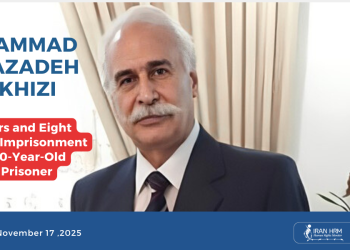On Wednesday, July 16, 2025, an attempt by Iranian prison authorities to forcibly transfer Saeed Masouri, the longest-held political prisoners in Iran, was halted due to collective resistance by fellow political prisoners at Qezel Hesar Prison, located in Karaj, near Tehran.
According to a statement released by these prisoners, officials sought to move Masouri, imprisoned for 25 years, to an undisclosed location. Security agents reportedly used deception and pressure tactics, summoning Masouri under the pretext of administrative matters. After he passed through the barred gate leading to the office of Ward 4’s director, the door was locked behind him. However, recognizing the pattern from past experiences, Masouri suspected the true intention was to forcibly transfer him elsewhere.
One of the political prisoners accompanying Masouri quickly alerted others in the ward. A group of political prisoners rushed to the locked gate, where they found Masouri refusing to comply with the authorities’ orders. Their gathering compelled prison officials to reveal that Masouri was scheduled for transfer to a western or southwestern province. The exact destination remained undisclosed.

At a critical moment, as the barred gate was opened briefly for another prisoner, the protesting group managed to pull Masouri back into the ward. They sealed the ward’s entrance from the inside, chanting slogans and declaring their refusal to allow the transfer. Following this act of resistance, authorities informed the prisoners that Masouri’s transfer had been postponed until Saturday, July 19, 2025, but emphasized their determination to proceed by then.
In their collective statement, the prisoners condemned the practice of forcibly relocating political detainees to unknown locations, labeling it as a clear violation of human rights that has persisted throughout the Islamic Republic’s history. They linked the current pressures to the ongoing conflict in the region, suggesting that the authorities are using the war as a pretext to intensify crackdowns on political dissent.
The prisoners also pointed out that the Iranian government treats its own citizens as adversaries, rather than focusing on external conflicts. They described the atmosphere as one of escalating repression, marked by arbitrary arrests, mass accusations, and extreme pressure on political prisoners, sometimes leading to death.
The statement concludes with a call for solidarity from all freedom-seeking individuals to stand with the political prisoners of Ghezel Hesar in opposing this serious human rights violation.
The following individuals signed the statement:
- Mostafa Ramazani
- Reza Mohammad Hosseini Tam
- Loqman Aminpour
- Mehdi Hassani
- Ahmadreza Haeri
- Esmail Ahmadi Ragheb
- Arsham Rezaei
- Mohammad Shafei
- Hamzeh Savari
- Salahuddin Ziaei
- Abolhassan Montazer
- Meysam Dehban Zadeh
- Akbar Bagheri
- Ali Moezi
- Behrouz Ehsani
- Sepehr Emam Jomeh
- Reza Salman Zadeh
- Asadollah Hadi
- Khosrow Rahnama
Saeed Masouri, a veteran political prisoner, has been incarcerated since 2000, following his arrest and conviction on charges related to his alleged association with the People’s Mojahedin Organization of Iran (PMOI/MEK). His prolonged detention without release is viewed by international human rights organizations as emblematic of the Islamic Republic’s punitive measures against political dissidents.







